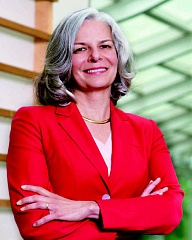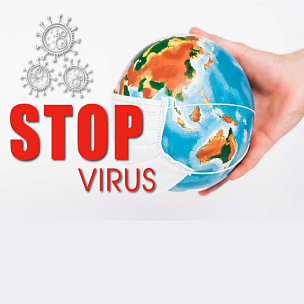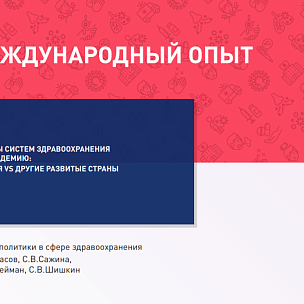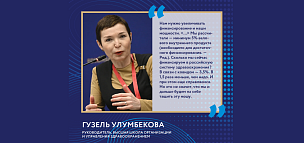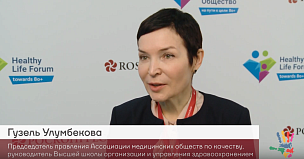As we live we can see that many diseases are defeated, and the lifespan and the quality of life are on the rise as never before. According to your point of view, what risks threaten mankind in the future? What are the reasons of their emergence?
We are fortunate to live during an era of unprecedented advances in life sciences and can enjoy the longer and more productive lives new medicines and vaccines help create. But we are also experiencing unprecedented health challenges, like antibiotic resistance, global infectious diseases outbreaks and even pandemics, cancer, and other non-communicable diseases. Unless we take collective actions to protect our global health security, we risk slowing or even reversing the momentum in global health improvement that we have enjoyed in recent decades.
Factors contributing to the increase in health threats are myriad, but some are especially powerful. First, in most countries, the population is ageing, and aging people are vulnerable to infections associated with waning immunity, neurodegenerative diseases, musculoskeletal problems, and cancer. The rising prevalence of cancers illustrates this challenge. The probability of almost all cancers increases with age. Although new approaches like immune-oncology treatments and gene therapy are emerging and giving hope to patients and their families, the incidence of cancer is expected to increase dramatically over the next 1020 years.
A second underlying source of health threats are attributable to our highly connected world through national and international transportation, communications, and social networks. In addition, wars, conflicts, and natural disasters have resulted in more than 60 million displaced people in the world, and many lack sanitation services in temporary refuges or have poor healthcare as they move from place to place. Global connectivity allows good ideas and new innovations to rapidly disseminate, but also rapidly disseminates threats to health, including human, animal, and plant infectious diseases, misinformation that discourages appropriate health decisions like good nutrition and vaccinations, and mass social marketing that legitimizes unproven or even dangerous interventions. Rising antibiotic resistance illustrates this challenge. The rapid global spread of resistant bacteria has led to untreatable infections among humans and animals and is a major health threat. In 2016, a review initiated by the government of the United Kingdom found that, if left unchecked, antimicrobial resistance could result in 10 million annual deaths and a cumulative global cost of USD 100 trillion by 2050. A few companies, like MSD, are making research investments to speed discovery of antimicrobials, vaccines, and alternatives, but progress is slow and may not keep pace with the growing need. In the meantime, we have to cherish the antibiotics that still work and use them only when necessary. That is why MSD and others are also strong advocates for policies and practices that monitor resistance, promote appropriate use of antibiotics, and encourage incentives to invest in new solutions.
The rapid global spread of resistant bacteria has led to untreatable infections among humans and animals and is a major health threat. If left unchecked, antimicrobial resistance could result in 10 million annual deaths and a cumulative global cost of USD 100 trillion by 2050
Finally, we are living in an era when the global economy is not growing as fast as we have seen in the past. As a result, many governments are challenged to secure the revenues necessary to pay for social services that support health security. Though some governments are finding innovative ways to create headroom for new medicines and vaccines that provide high long-term value for patients and payers, all too often the short-term pressures of balancing a fiscal budget deter these investments. As a result, people dont have timely access to improved standards of preventive services and appropriate healthcare.
Could you provide us with the trends of modern pharmacology?
Drug development now functions in a growing eco-system of innovation that includes academic research institutes, small biotechnology companies, large pharmaceutical companies, and entrepreneurial disrupters. By approaching health challenges with
of players, the probability that one or more truly valuable solution to an important health challenge will emerge is increased. However, it is also true that the probability that any one group will be successful continues to decline over time, and the investment required to achieve that success is increasing. The good news is that the pace of bioscientific discovery is accelerating, and we are beginning to unravel some of the most vexing population health challenges, like cancer, Parkinsons disease, chronic pain, and others. Once we understand the physiology, the prospects for finding new therapeutic targets and drugs or biologics are good. At MSD, we use this strategy to «follow the science», wherever it takes us, instead of limiting ourselves to a few specific therapeutic areas or targets. Over our 128-year history, this has consistently been a winning strategy. For example, we learned that one of our drugs restored the ability of the immune system to recognize and attack certain cancers. Following that lead, we now have the largest immuno-oncology clinical development programme in the industry with more than 1,000 trials across more than 30 tumor types. Were also working through large and small partnerships and collaborations and have broadened our portfolio and pipeline to include more than 20 new investigational oncology candidates.
The Russian authorities have set a task to increase the average lifespan to 80+ years. In your opinion, what requirements should be met in order to achieve it? What factors depend on the government and what factors depend on business? How does MSD participate in this process?
Over our 128-year history, at MSD, we use this strategy to «follow the science». For example, we learned that one of our drugs restored the ability of the immune system to recognize and attack certain cancers
As a population health goal, the governments aspiration to increase the average lifespan to 80+ years is commendable. Cardiovascular disease, diabetes, and cancer are the leading causes of premature death in Russia. Full deployment and uptake of established medicines and standards of care for these conditions is critical to maximizing population health and reducing mortality and morbidity. However, protecting health and assuring longevity begins long before the need for disease treatments is evident. Health is created not only in hospitals and clinics. It is created at home, in schools, and in communities where safe environments encourages physical activity, where infants and children get a healthy start in life with good prenatal care, proper nutrition, and the security of a loving home, where people are protected from infectious diseases through adherence to the lifelong schedule of recommended vaccines, where tobacco, excessive alcohol, and other substance use is discouraged, where social supports nurture and support mental health, and where the health system encourages prevention and early detection of disease risks.
MSD is committed to supporting the health goals of the Government of Russia and leveraging our portfolio of products and expertise to help catalyze success. Our vaccines are a key pillar of infectious disease preventive care across all life stages, and our portfolio also includes medicines that address HIV, HCV, CMV, as well as serious bacterial and fungal infections. Also, many of our medicines address cardiovascular diseases, diabetes, and cancer, which as I mentioned already, are the three most important causes of premature death in Russia.

A timely vaccination helps prevent many infectious diseases
What is special about work in the Russian market?The Russian healthcare system is evolving and expanding to take on several health initiatives, including expanding national immunization programmes and the 80+ average lifespan club. The governments visible leadership commitment is key and will help generate the community engagement necessary for success. But community engagement will take effort, given the diverse population and its broad geographic distribution, and that requires collaboration across many stakeholders. For our part, MSD is committed to working with the Russian Ministry of Health and the other stakeholders to achieve their health goals. Our medicines and vaccines, as well as our scientific expertise, will help ensure success. We look forward to doing our part!
Can you share the importance of the patient and their voice and their role in the drug development process?
We view patients as our most important partners across the entire drug development cycle, from discovery to manufacturing to delivery. We develop strong partnerships with both patients and their advocacy groups to gain insights into what patients and their caregivers value and need from their medicines and vaccines. They help us shape clinical trials, prioritize policies, and improve timely and affordable access to therapies that address their priorities,
not just ours.


